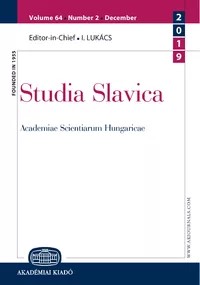«Не сводя глаз с Парижа»: влияние французского языка на значение книжныж славянизмов на рубеже XVIII и XIX веков
“Feast your eyes on Paris”: The influence of French on the meaning of book Slavicisms at the turn of the XVIII and XIX centuries
Author(s): Tivadar Palágyi, Angela PalágyiSubject(s): Eastern Slavic Languages
Published by: Akadémiai Kiadó
Keywords: calque; etymological dictionaries; Russian language; Old Church Slavonic; Modern Greek; Ancient Greek; French language;
Summary/Abstract: The paper analyses the calques from French in Russian by including as tertium comparationis, Modern Greek. Both languages, Russian and Greek, were characterised by having at their disposal a prestigious sacred language with a significant abstract vocabulary in order to modernize their language at the turn of the eighteenth and nineteenth centuries. In the case of the Russian language, we are talking about Church Slavonic, and in the case of Greek about Ancient Greek, which encompassed the whole of ancient culture in addition to the biblical and Byzantine vocabulary, which had already been translated into Church Slavonic in the Middle Ages with the help of calques. The new concepts of the Enlightenment were vehicled in Europe by the French language. Innovative linguists-translators and writers in both countries endeavoured to adapt their own prestigious vocabulary, inherited from the past, to the French concepts of the modern era. This was often achieved by semantic calques, that is, by borrowing new meanings inherent to French words and applying them to already existing Church Slavonic or Ancient Greek words. The paper compares different Russian and Greek etymological dictionaries to find out the attitude towards calques in both cultures. Based on the analysed examples, it can be asserted that the different Russian etymological dictionaries are relatively uniform in their assessment of semantic calques. Unlike Russian dictionaries, Greek dictionaries have a much higher proportion of recognised loanwords. Compared to Babiniotis’ dictionary, the Dictionary of Modern Greek (Λέξικο της κοινής νεοελληνικής) of the Triandafyllidis Foundation tends to see a greater French influence on the modern meaning of ancient Greek words.
Journal: Studia Slavica Academiae Scientiarum Hungaricae
- Issue Year: 69/2024
- Issue No: 2
- Page Range: 181-194
- Page Count: 14
- Language: Russian

